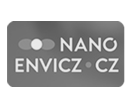Multi-electron transfer within oligo-pyridinium assemblies: structure-reactivity relationship
Topics
Year from
2016
Year to
2017
Aim of the project is focused on the structure-reactivity relationship within the pyridinium-based molecules containing multiple redox centers. Their charge transfer mechanism and electron transfer kinetics will be studied with particular focus on the effect of structural and conformational changes on the reactivity of such molecules. Large substituents on the active center (steric effect) will be used to tune the ability of the active site to undergo structural changes upon electron transfer. This will be experimentally measurable as an extent of the potential compression. Another type of structural correlation will be based on a different degree of quarterization of the nitrogen atom of the pyridinium redox center. Finally, we will address the electron transfer mechanism issues in a series of molecules that contain multiple redox centers, e.g. N-pyridinio substituent on another N-pyridinio center. This type of compounds will be synthesized and characterized as a model for “redox anthenna” initiated by an intramolecular electron transfer. We plan to prepare a series of molecules with increasing distance between the donor and acceptor part. Such electron transfer studies will suggest the appropriate model series for single molecule conductance measurements. Equally ambicious is our goal to correlate these values with classically obtained electron transfer parameters. Our long-term goal is to explore electron transfer kinetics in new two-dimensional materials that will enable us to achieve desired functionality (molecular wires and rectifiers, or even molecular oscilators). Should charge transfer be determined by molecular properties and not by metal/molecule interface, the electrochemical study of charge transfer rates constitutes the most relevant source of information. Results will be published in international journals and participation of students is expected for further strengthening of the cooperation.
Mgr. HROMADOVÁ Magdaléna Ph.D.
Room
507, 06
Extension
3197, 3068
E-mail
magdalena.hromadova jh-inst.cas.cz
jh-inst.cas.cz
 jh-inst.cas.cz
jh-inst.cas.cz















